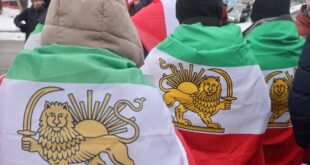TEHRAN (AP) — Iran braced for more confrontation with the West on Sunday as the foreign ministry said it wouldn’t even consider abiding by a UN resolution that calls for a freeze of uranium enrichment and the army tested a new missile during large military manoeuvres.
Foreign ministry spokesman Hamid Reza Asefi confirmed, however, that Iran would offer on Tuesday a “multifaceted response†to a Western package of incentives aimed at persuading Tehran to suspend enrichment activities but insisted it would not cease enriching uranium altogether.
Asefi said a compromise would have to be reached during future negotiations.
“We won’t suspend [uranium enrichment]. Everything has to come out of negotiations. Suspension is not on our agenda,†Asefi told a press conference Sunday.
The UN Security Council resolution passed last month gives Tehran until August 31 to freeze uranium enrichment or face political and economic sanctions. Iran has rejected the resolution as “illegal.†The United States repeated its warning Sunday that Iran would be penalised if it does not abide by the resolution.
“We have made clear that if Iran fails to comply with the Security Council’s mandate, we will move quickly at the United Nations to impose sanctions,†White House spokeswoman Emily Lawrimore said.
Iranians appeared to consider that the US and Israel — the leading proponents of a tough stance against Tehran’s nuclear programme — have lost ground in the Middle East after the Lebanese Hizbollah resisted Israeli air and ground assaults during the 34-day war that ended last Monday.
“Hizbollah is the front line for any attack against Iran,†said Hamid Reza Shokouhi, the political editor at the conservative Rah-e-Mardom newspaper in Tehran.
“After Hizbollah’s victory, Iran can stand up stronger in defending its nuclear rights,†the journalist said, voicing a widespread opinion in the Iranian capital.
Iran helped create Hizbollah and is the Shiite Muslim group’s main backer. It has nonetheless denied repeated Israeli claims that it armed the group with sophisticated missiles and trained its fighters.
Since the UN-brokered ceasefire ended more than a month of bloody combat on Monday, Hizbollah aid workers have been seen in parts of the Lebanese capital distributing $12,000 in cash to people whose homes were destroyed by Israeli bombs.
However, the foreign ministry dismissed widely held beliefs that Iran was providing the funds.
“Hizbollah is a legitimate body in Lebanon, they have their own economic resources and popular support there,†Asefi said.
In a further show of military might, Iran test-fired a new short-range missile during a series of large-scale military manoeuvres geared at testing the country’s defensive doctrine, state-run television reported.
The 10 surface-to-surface short-range Saegheh missiles fired Sunday have a range of between 50 and 150 miles, the report said. It did not specify whether the missile was capable of carrying a nuclear warhead, but it was not believed to be.
State-run television said the missile was built based on domestic know-how, although outside experts say much of the country’s missile technology originated elsewhere.
The White House condemned Iran’s “show of military force†and said it “serves to remind us of the dangers of its nuclear ambitions.†“Iran sits at the nexus of weapons of mass destruction and terrorism,†Lawrimore said. “We know that Iran is producing and developing delivery systems that could threaten our friends and allies in the Middle East and Europe and eventually the United States itself.†Iran already is equipped with the Shahab-3 missile, which is capable of carrying a nuclear warhead. An upgraded version of the ballistic missile has a range of more than 2,000 kilometres and can reach Israel and US forces in the Middle East.
Last year, former Defense Minister Ali Shamkhani said Tehran had successfully tested a solid fuel motor for the Shahab-3, a technological breakthrough for the country’s military.
The latest military manoeuvres came as Iran plans to offer its formal response on August 22 to a package of Western incentives offered in June that calls on the Islamic republic to suspend, not permanently halt, the enrichment programme.
“It will be a multifaceted response,†the foreign ministry spokesman said.
The package offers a series of incentives to Iran including promises that the United States and Europe will provide civilian nuclear technology and that Washington will join direct talks with Iran.
Asefi said part of the package was “convincing†but there still are ambiguities that need to be clarified in talks.
The Islamic republic says uranium enrichment does not violate any of its obligations under the nuclear Non-Proliferation Treaty, and that its nuclear programme is purely geared at producing electricity. The US and its allies say Iran is researching an atomic bomb.
Asefi warned that Europe would be the “loser†if it followed the US in imposing sanctions against Iran under the UN resolution.
The foreign ministry spokesman said Iran has lived with US sanctions for nearly three decades and has made all preparations for tougher time.
He also insisted the world can’t afford ignoring a powerful country like Iran and join the US in imposing sanctions.
“Iran’s influence in the region is clear. A country like Iran has extensive political, economic and cultural capabilities. Will other countries ignore Iran’s capabilities in their political and economic cooperation?†he said.
 Eurasia Press & News
Eurasia Press & News



